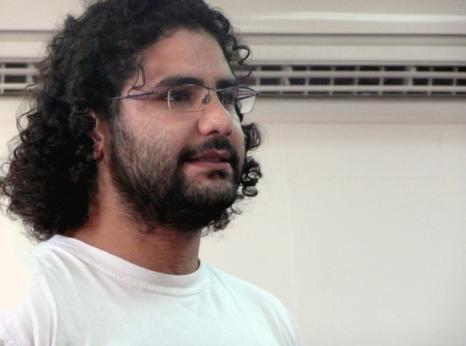Egypt: Prominent Activist In Critical Condition

Alaa Abdel Fattah, a well-known political activist and government critic, has been repeatedly arrested in the past decade including for his role in the 2011 uprising. Mohamed Baker is a human rights lawyer and director of Adalah Center for Rights and Freedoms, which he founded in 2014.
Mohamed Baker and Alaa Abdel Fattah have been detained since 29 September 2019 pending investigations into charges of “joining a terrorist group”, “funding a terrorist group”, “disseminating false news undermining national security” and “us[ing] social media to commit a publishing offence” under Case No.1356/2019 of the Supreme State Security Prosecution (SSSP), a branch of the Public Prosecution specialized in investigating national security threats. The SSSP opened investigations into similar charges against them under new Case No. 1228/2021 as part of a strategy increasingly used by the authorities, referred to as "rotation", to circumvent the two-year limit for pre-trial detention allowed under Egyptian law and indefinitely extend the detention of activists. The trial of Alaa and Mohamed in Case No. 1228/2021 started on 28 October 2021, together with another defendant, blogger and activist Mohamed Ibrahim Radwan “Oxygen”, who was also convicted on charges of “spreading false news” in relation to social media posts and sentenced to four years’ imprisonment. Proceedings before emergency courts are inherently unfair as their verdicts are not subject to appeal by a higher tribunal. The defendants were also denied their right to adequate defence as their lawyers were prevented from communicating with them in private and photocopying the casefiles, indictments and verdicts. On 3 January 2022, President Abdel Fattah al-Sisi ratified the verdict against all three. A document seen by Amnesty International indicated that the sentence commenced from the date of ratification, rather than from the date of their arrests.
Alaa Abdel Fattah and Mohamed Baker were held in inhumane conditions at the Tora Maximum Security 2 Prison, in Cairo until May 2022. Prison authorities held them in small, poorly ventilated cells and have denied them beds and mattresses. Unlike other prisoners, they were prohibited from exercising in the prison yard and were not allowed to use the prison library or receive books or newspapers from outside prison at their own expense. The prison authorities also denied them adequate clothing, radios, watches, access to hot water and any personal belongings, including family photos. On 12 May, Alaa Abdel Fattah told his mother that he was beaten while handcuffed by the deputy prison warden at Tora Maximum Security 2 prison. On 18 May 2022, he was transferred to Wadi al-Natrun Prison after significant public pressure. On 2 October, Mohamed Baker was transferred to Badr 1 Prison. His wife was allowed to visit him for the first time in two years without bars and he was allowed access to sunlight for the first time in three years. Prison authorities banned them from any phone calls in contravention to Egypt’s obligations under international human rights law and of Article 38 of Law 38 396/1956 on Prisons. Amnesty International has consistently documented the Egyptian authorities’ denial of adequate healthcare to prisoners and has raised concerns over the independence of medical staff in Egyptian prisons, who report to the Ministry of Interior. This includes concerns over interferences by prison wardens and security forces in prisoners’ medical assessments and in decisions over their healthcare, including delays or refusals to transfer critically ill prisoners to outside facilities for treatment. As such, there are strong grounds to believe that decisions over Alaa Abdel Fattah’s healthcare will not be made by independent medical professionals in compliance with medical ethics and free from coercion or interference by the authorities.
Since the President’s reactivation of the Presidential Pardons Committee in April 2022, the Egyptian authorities released high-profile prisoners of conscience and hundreds of others held for political reasons. However, thousands remain arbitrarily detained solely for exercising their human rights, or following grossly unfair trials, or without legal basis. During the UN Global Climate Change Conference, held in Egypt between 6 and 18 November, a chorus of voices have called on the Egyptian authorities to release Alaa. On 8 November, expressing deep regret at his ongoing detention, UN High Commissioner for Human Rights, Volker Türk, called for his immediate release and urged the authorities to provide him with the necessary healthcare.